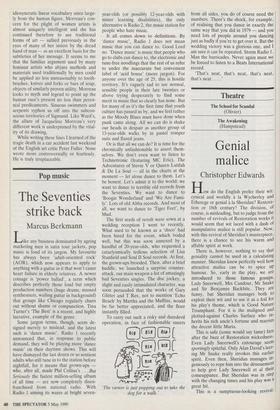Pop music
The Seventies strike back
Marcus Berkmann
Like any business dominated by ageing marketing men in satin tour jackets, pop music is fond of its jargon. My favourite has always been 'adult-oriented rock' (AOR), which now appears to apply to anything with a guitar in it that won't cause heart failure in elderly relatives. A newer coinage is 'power ballad', a term which describes perfectly those loud but empty production numbers (huge drums, massed synthesisers, wailing guitar in background) that groups like Chicago regularly churn out without shame or compunction. Tina Turner's 'The Best' is a recent, and highly lucrative, example of the genre.
Some jargon terms, though, seem de- signed merely to mislead, and the latest such is 'dance music'. Radio 1 recently announced that, in response to public demand, they will be playing more 'dance music' on their daytime shows. This will have dismayed the last dozen or so sentient adults who still tune in to the station before nightfall, for it means that grown-ups who, after all, made Phil Collins's . . .But Seriously the fastest million-selling album of all time — are now completely disen- franchised from national radio. With Radio 1 aiming its wares at bright seven- year-olds (or possibly 12-year-olds with minor learning disabilities), the only alternative is Radio 2, the music station for people who hate music.
It all comes down to definitions. By `dance music', Radio 1 does not mean music that you can dance to. Good Lord no. 'Dance music' is music that people who go to clubs can dance to, the electronic and tune-free noodlings that the rest of us refer to under the inaccurate but convenient label of 'acid house' (more jargon). For anyone over the age of 25, this is hostile territory. It's vaguely sad to see normal, sensible people in their late twenties or above trying desperately to find some merit in music that so clearly has none. But for many of us it's the first time that youth culture has passed us by, and we feel rather as the Moody Blues must have done when punk came along. All we can do is shake our heads in despair as another group of 13-year-olds walks by in pastel romper suits and flared jeans.
Or is that all we can do? It is time for the chronically unfashionable to assert them- selves. We don't even want to listen to Technotronic (featuring MC Eric), The Adventures of Stevie V or Queen Latifah & De La Soul — all in the charts at the moment — let alone dance to them. Let's be honest. Let's admit it to the world: we want to dance to terrible old records from the Seventies. We want to dance to `Boogie Wonderland' and `We Are Fami- ly'. Lots of old Abba records. And most of all, we want to dance to 'Tiger Feet', by Mud.
The first seeds of revolt were sown at a wedding reception I went to recently. What used to be known as a 'disco' had been hired for the event, which boded well, but this was soon annexed by a handful of 20-year-olds, who requested a cataclysmically tedious selection of Lisa Stanfield and Soul II Soul records. At first, the grown-ups brooded. Then, after a brief huddle, we launched a surprise counter- attack, our main weapon a list of amazingly bad Seventies singles. The disc jockey, a slight and easily intimidated character, was soon persuaded that the works of Gary Glitter and T Rex, not to mention `Echo Beach' by Martha and the Muffins, would be far better appreciated, and the floor instantly filled.
To carry out such a risky and daredevil operation, in face of fashionable sneers 'The viewer is just popping out to take the dog for a walk.' from all sides, you do of course need the numbers. There's the shock, for example, of realising that you dance in exactly the same way that you did in 1979 — and you need lots of people around you dancing just as badly if you're to get over it. But the wedding victory was a glorious one, and I am sure it can be repeated. Storm Radio 1. Man the barricades. Never again must we be forced to listen to a Beats International record.
`That's neat, that's neat, that's neat, that's neat. . .


















































 Previous page
Previous page